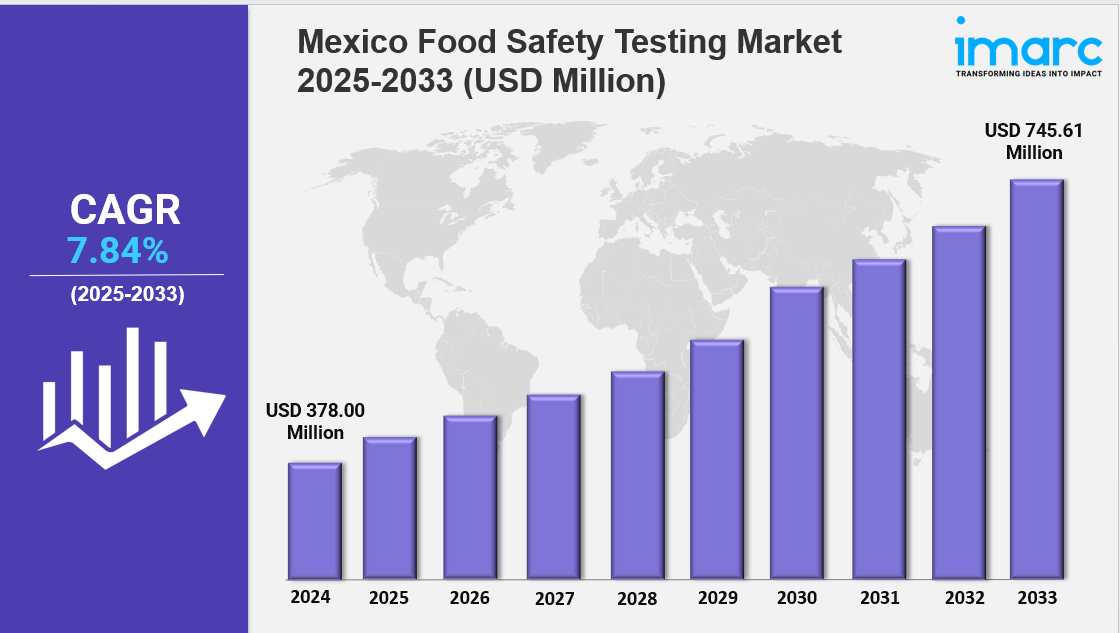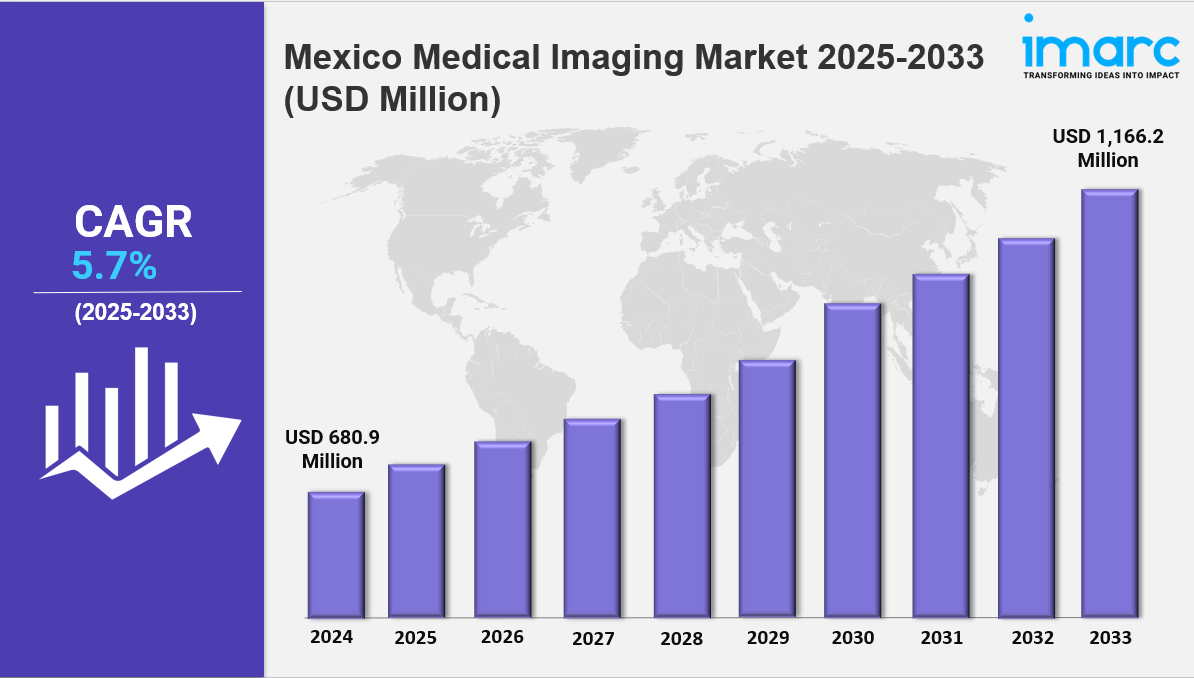IMARC Group has recently released a new research study titled “Mexico Food Safety Testing Market Size, Share, Trends and Forecast by Type, Food Tested, Technology, and Region, 2025-2033,” which offers a detailed analysis of the market drivers, segmentation, growth opportunities, trends, and competitive landscape to understand the current and future market scenarios.
Mexico Food Safety Testing Market Overview
The Mexico Food Safety Testing Market size reached USD 378.00 Million in 2024. Looking forward, IMARC Group expects the market to reach USD 745.61 Million by 2033, exhibiting a growth rate (CAGR) of 7.84% during 2025-2033.
Market Size and Growth
Base Year: 2024
Forecast Years: 2025-2033
Historical Years: 2019-2024
Market Size in 2024: USD 378.00 Million
Market Forecast in 2033: USD 745.61 Million
Market Growth Rate 2025-2033: 7.84%
Request for a sample copy of the report: https://www.imarcgroup.com/mexico-food-safety-testing-market/requestsample
Key Market Highlights:
✔️ Growing consumer awareness and regulatory pressure driving demand for food safety testing
✔️ Rising cases of foodborne illnesses increasing the need for stringent quality checks
✔️ Expansion of processed and packaged food industry fueling testing requirements across the supply chain
Mexico Food Safety Testing Market Trends
The Mexico Food Safety Testing Market is evolving rapidly, driven by regulatory reforms, rising export demands, advanced technologies, and growing consumer awareness. As food safety becomes central to both Mexico’s trade strategy and its public health agenda, the market is expanding with stronger standards and broader capabilities. Today, both local producers and global exporters are operating in an environment where transparency, speed, and scientific accuracy are no longer optional — they are essential.
Regulatory Reforms Strengthening Market Growth
One of the strongest drivers of the Mexico Food Safety Testing Market has been regulatory alignment with international standards, especially through the modernized United States-Mexico-Canada Agreement (USMCA). In 2024, new amendments to NOM-251-SSA1-2009 introduced stricter testing requirements for pathogens such as Salmonella and Listeria, alongside enhanced checks for pesticide residues and heavy metals.
These changes directly support Mexico’s booming export sector — U.S. imports of Mexican food products rose 15% in 2024 — but they also place new responsibilities on producers. Food companies are now required to obtain certifications from accredited third-party labs, or risk losing access to export markets. This shift has spurred significant private investment in advanced laboratories and diagnostic technologies.
Domestic enforcement is also reshaping the Mexico Food Safety Testing Market Report. After several foodborne illness outbreaks in 2024, COFEPRIS (Federal Commission for Protection Against Health Risks) increased its audits of food facilities by 23%. Key agricultural hubs such as Jalisco, Michoacán, and Sinaloa have since seen rapid growth in testing infrastructure, supported by public-private partnerships. These collaborations are equipping regional labs with next-generation tools, making testing more accessible, accurate, and faster than ever before.
Technology Transforming Food Safety Testing
Technology adoption is another powerful force behind the Mexico Food Safety Testing Market. Traditional microbiology methods are increasingly being replaced by faster and more precise techniques like PCR (polymerase chain reaction), immunoassays, and next-generation sequencing (NGS).
By mid-2024, more than 40% of labs in Mexico had adopted AI-powered analytics platforms to reduce false negatives, while blockchain traceability solutions are being rolled out by industry leaders such as Grupo Bimbo and Lala. Even small-scale food vendors are embracing portable ATP bioluminescence devices and rapid test kits, ensuring safer food at farmers’ markets and street stalls. This democratization of technology is helping bridge the gap between large exporters and smaller businesses.
Consumer Awareness and Retail Accountability
Mexican consumers are becoming key drivers of the Mexico Food Safety Testing Market Outlook. Campaigns like ComidaSegura (Safe Food) gained traction after high-profile recalls in 2024, pushing demand for clean, traceable, and certified food. In response, nearly one-third of national food brands now use QR codes on packaging to give shoppers instant access to safety certifications.
Retailers are also tightening standards. Chains such as Walmart México and Chedraui reported rejecting more shipments in 2024 compared to 2023 due to safety failures. Meanwhile, plant-based food producers like NotCo and Heura are requiring more frequent toxin testing to reassure consumers of product safety.
Mexico Food Safety Testing Market Report: Size and Future Outlook
According to the latest Mexico Food Safety Testing Market Report, the industry is on a strong growth trajectory. Valued at over $1.8 billion by 2033, the market is expected to grow at a CAGR of 7.84% between 2025 and 2033. This expansion is being fueled by:
Mandatory HACCP certification for meat and poultry processors.
The expansion of global testing companies like Eurofins and SGS, which grew Mexican operations by 18% in 2024.
The rise of e-commerce platforms such as Amazon México and Mercado Libre, which are implementing stricter safety checks for packaged and frozen foods.
National support programs like SENASICA’s 2024 subsidy initiative, which is helping small-scale producers gain access to modern testing.
Innovation and Leadership in Food Safety
Looking ahead, the Mexico Food Safety Testing Market Outlook suggests innovation will remain the key to growth. AI-driven diagnostics, IoT sensors for real-time monitoring, and blockchain-based traceability are positioning Mexico as a leader in food safety across Latin America.
Although cost and access challenges remain for rural producers, the combination of stricter regulation, rising exports, and empowered consumers ensures that food safety will stay at the center of Mexico’s food industry transformation in the years ahead.
Mexico Food Safety Testing Market Segmentation:
The market report segments the market based on product type, distribution channel, and region:
Breakup by Type:
Pathogen
Genetically Modified Organism
Chemical and Toxin
Others
Breakup by Food Tested:
Meat and Meat Products
Dairy and Dairy Products
Cereals, Grains, and Pulses
Processed Food
Others
Breakup by Technology:
Agar Culturing
PCR-based Assay
Immunoassay-based
Others
Breakup by Region:
Northern Mexico
Central Mexico
Southern Mexico
Others
Competitive Landscape:
The market research report offers an in-depth analysis of the competitive landscape, covering market structure, key player positioning, top winning strategies, a competitive dashboard, and a company evaluation quadrant. Additionally, detailed profiles of all major companies are included.
Key Highlights of the Report
1. Market Performance (2019-2024)
2. Market Outlook (2025-2033)
3. COVID-19 Impact on the Market
4. Porter’s Five Forces Analysis
5. Strategic Recommendations
6. Historical, Current and Future Market Trends
7. Market Drivers and Success Factors
8. SWOT Analysis
9. Structure of the Market
10. Value Chain Analysis
11. Comprehensive Mapping of the Competitive Landscape
About Us:
IMARC Group is a leading market research company that offers management strategy and market research worldwide. We partner with clients in all sectors and regions to identify their highest-value opportunities, address their most critical challenges, and transform their businesses.
IMARC’s information products include major market, scientific, economic and technological developments for business leaders in pharmaceutical, industrial, and high technology organizations. Market forecasts and industry analysis for biotechnology, advanced materials, pharmaceuticals, food and beverage, travel and tourism, nanotechnology and novel processing methods are at the top of the company’s expertise.
Contact Us:
IMARC Group
134 N 4th St. Brooklyn, NY 11249, USA
Email: sales@imarcgroup.com
Tel No:(D) +91-120-433-0800
United States: + 1 201971-6302






